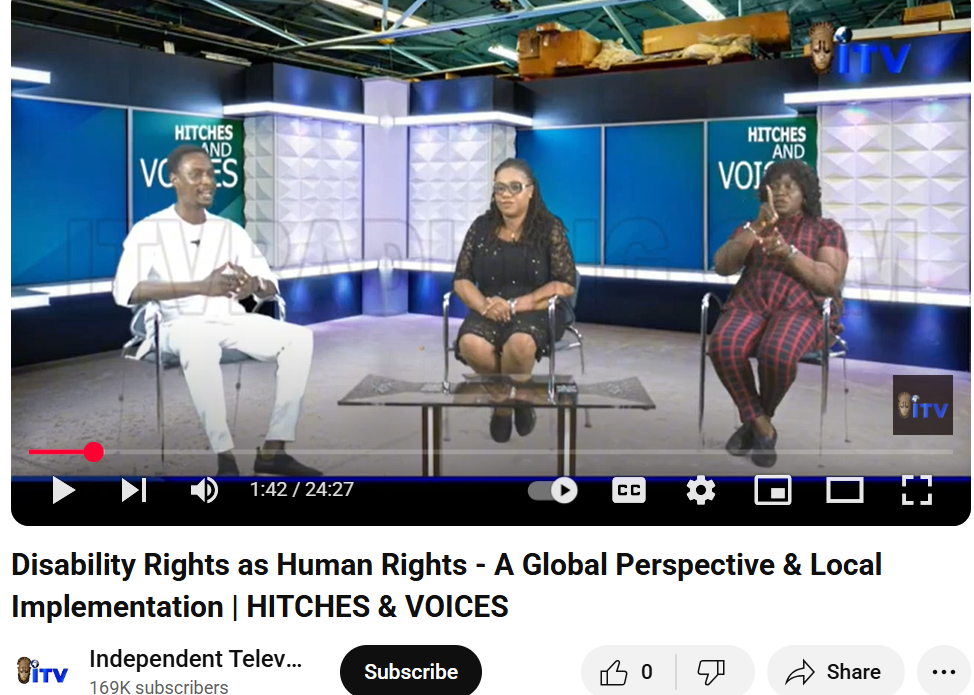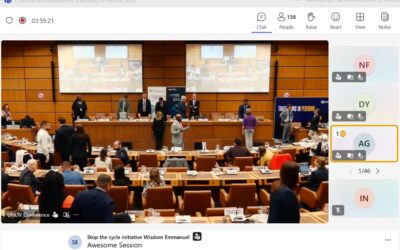
On the June 27, 2025 edition of Hitches and Voices, Dr. Anwuli Ofuani-Sokolo, Associate Professor of Law at the University of Benin, underscored an important truth: disability rights are not favors or acts of goodwill — they are fundamental human rights that every society must recognize, protect, and enforce. She noted that framing disability issues as matters of sympathy or benevolence undermines the dignity of persons with disabilities (PWDs) and makes their rights appear optional, when in reality these rights are guaranteed under the law and cannot be denied.
Dr. Anwuli stressed that persons with disabilities are right holders, not charity cases. They are individuals entitled to the same protections, opportunities, and freedoms as everyone else, and their inclusion in society is a matter of justice, not pity. She explained that a society which views PWDs through a lens of charity alone fails to create systems that respect their contributions and potential. Moving away from pity to equality, she said, requires intentional changes in attitude, policy, and practice. She further highlighted that the Edo State Disability Law stands as one of the strongest legal safeguards in Nigeria at the state level. The law guarantees equal access to education, employment, housing, healthcare, and other opportunities, while explicitly prohibiting discrimination in any form. It sets a framework through which PWDs can demand justice and protection, making it clear that their rights are not negotiable.
Citing Section 5 of the law, she carefully outlined the penalties for violations, making it clear that discrimination has consequences and is not to be taken lightly. These penalties include:
-
₦250,000 fine for organizations found guilty of discrimination against persons with disabilities
-
₦100,000 fine or six months imprisonment for individuals who engage in acts of discrimination
-
₦50,000 fine for landlords who deny housing or refuse tenancy to PWDs
-
₦50,000 fine for individuals or groups who use PWDs to beg for alms
Dr. Anwuli explained that these penalties were not just symbolic; they were deliberately included to deter acts of exclusion and exploitation. By holding organizations, individuals, and landlords accountable, the law signals that discrimination is not simply a social wrong but a legal offense that carries financial and criminal consequences. She added that provisions such as those against using PWDs for street begging highlight the importance of protecting their dignity and preventing exploitation under the guise of assistance.
However, Dr. Anwuli emphasized that passing a disability law, no matter how progressive, is only the beginning of meaningful inclusion. For the law to bring about real change in the daily lives of PWDs, there must be widespread awareness and consistent enforcement. She pointed out that many members of the public are unaware that such a law exists, and as a result, violations often occur without challenge. Without education, PWDs themselves may not know the rights available to them, and without enforcement, those who discriminate will continue to do so without fear of consequences.
She called on the government to intensify awareness campaigns, especially at the community level, to ensure that citizens, institutions, and employers understand their responsibilities under the law. She urged state agencies to actively monitor compliance in workplaces, schools, and public spaces. Civil society groups, the media, and local organizations, she added, also have vital roles to play in driving awareness and keeping the government accountable. Only through this combined effort can the law move from being words written on paper to becoming a living instrument that protects people in practice.
Her closing message was both clear and firm: inclusion is not charity, it is justice. She reminded the audience that disability rights are part of the broader human rights framework, and ensuring inclusion is not an act of kindness but a responsibility of society as a whole.



